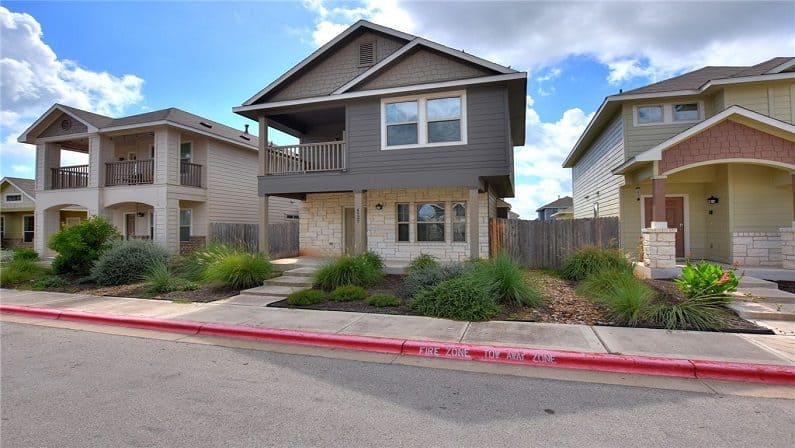Condo Insurance
Protect what’s Inside your Unit, and It All Starts with A Free and Fast Quote.
// AUSTIN #1 CONDO INSURANCE
What is HO-6 insurance?
While living in a condominium may feel like an extended vacation, you still need to consider how to protect your unit. Condo insurance provides coverage for your property and personal liability. It is essential to know what you need in a policy to ensure that you are protected if anything happens. The Condo association’s master insurance policy covers the exterior structure of your home, but it does not include the interior of your condo or any of your personal belongings.
HO-6 insurance is another term used for condo insurance. The term refers to one of several home insurance policy forms used industrywide. For example, most homeowners are insured with HO-3 policies, while renters have HO-4 policies.

Why do you need condominium insurance?
Condo insurance coverage is vital if you own a condominium unit as part of a larger building and the exterior of your home is shared with other teams. Condominium insurance is essential for many reasons, but one of the most significant benefits is that it provides its residents’ peace of mind knowing they can rely on their policy in case of disaster strikes, from fire to theft and even vandalism.
Condo owners will feel confident that personal belongings are covered by comprehensive coverage. You’re also covered for liability protection and medical bills, for example, a neighbor slipping on your wet kitchen floor and wanting to sue you. Condo insurance covers water damage to interior walls, flooring, and fixtures in your unit.
How much would it cost to replace my stuff?
If you have ever made a garage sale or ever been to one, you know the general rule is twenty-five cents to the purchased dollar. That doesn’t apply to your belongings if you are not selling. Do you know the value of your belongings? is it Actual Cost Value or Replacement Value? It may be more than you think. You can use a handy personal property calculator to see the cost of replacing your:
Furniture
Appliances
Clothing
Electronics
Jewelry, etc.
Customers who need a condo insurance policy may want to protect their expensive jewelry, vintage music instruments, or baseball card collection. In your typical condo insurance policy, we would need endorsements added to increase the coverage limit. This optional coverage for engagement rings, Watches, and wedding bands would give enough coverage for your valuables when they’re lost or stolen!
What does a condo insurance policy cover?
Condo insurance policies from Risk Coverage Insurance Agency generally come with certain standard features. These include:
Personal Property Coverage
Personal property coverage is available with condo insurance, and it protects your belongings in the event of a covered loss. For example, if there’s a fire in your unit and all of your furniture and appliances are destroyed, personal property will pay to replace them.
Unit Coverage
Unit coverage is a broad form of protection that provides replacement value of the unit’s interior if damaged. For example, if there’s a fire or flood that causes significant damage to the entire interior of the building, this type of policy will pay the cost of rebuilding it to its original state.
- Carpeting
- Interior walls
- Cabinets

Personal Liability Coverage
Your condo insurance policy will help protect you against the liability that comes with living in a shared environment. For example, the visitor can sue you if someone slips on water leaked inside your unit due to faulty plumbing. Your liability policy also includes medical payment coverage for people who don’t live with you and get injured on your property.

Budget-Friendly Discounts
In addition to providing you with several options for policies that suit your needs, we’ll also let you know if you qualify for any discounts so that you can save money on your premiums. Typical discounts include an auto policy with us, Deadbolts locks, or a monitored security alarm system.
Loss of Use
Loss of use coverage, also known as additional living expense coverage, isn’t as well-known as property or structural coverage, but it can be precious.
If your condo becomes uninhabitable due to damage or evacuation order, loss of use coverage reimburses you for the extra expenses you incur to maintain your regular standard of living away from home.

Loss Assessment
The condo association is responsible for covering the cost of a big fire or hail storm in the neighborhood, but what if the event cost is so high? It surpasses the limits of the condo association’s master policy?. Each unit owner might need to contribute funds towards making up for it. If you’re lucky enough to have loss assessment coverage on your insurance plan, then these costs will be paid out by your insurance policy.
What doesn’t my condo insurance policy cover?
Most condo insurance policies typically don’t cover damage involving:
- Short-term renters (less than three to six months)
- Bites from dangerous-breed pets, such as pit bulls (be sure to ask)
- Damage from insects and vermin, like bedbugs
- Damage and loss of use of the condo from rising floodwaters
// faq
Condo Insurance: Get the answers you need.
What exactly will my insurance cover?
Condo insurance policies include three basic types of coverage: contents, “walls, floors and renovations,” and personal liability.
What is the difference between an HO-3, HO-4, and an HO-6 policy?
An HO-3 policy is the most common homeowners insurance policy, HO-4 for renters insurance, while an HO-6 policy is designed for condos. An HO-3 approach ensures single-family homes with coverage for the entire building, plus free-standing structures like sheds or fences. Because condo dwellers don’t own their building or the land it sits on, an HO-6 policy covers only their unit and its contents.
Does my building have any special insurance requirements? What about my mortgage bank?
It’s surprising how many people don’t know that your liability coverage is for injuries or accidents. It also protects against property damage like flooding, fires, and even theft! If you live in Austin, it’s essential to ensure the building has enough protection because your facility does not want to be involved in the claims process.
Lenders typically require condo owners to insure the interior structure (walls, floors, built-in renovations) for at least 80 percent of your loan value.
What are my options for deductibles?
The deductible is the amount you pay first in claims before your insurance company covers it. A typical starting point for most people’s deductibles ranges from around $250 up to about 2,500 dollars, with higher amounts available on particular policies that can be purchased if desired or needed by a respective customer base depending upon their needs at any given time during coverage.
I always recommend that people take the highest deductible possible to save on premiums and discourage filing small claims. It’s a little-known fact that if you file two claims within three years, your insurance company will not only balk at renewing but also put up barriers for future business as they blocklist those who constantly file claims.
Will my insurance pay for temporary housing if something happens to my condo?
Co-op and condo insurance policies often come with “loss of use” coverage if your apartment becomes inhabitable due to a covered peril such as fire, extensive water damage, or smoke. The amount varies by policy but can be up to 50%; we will always explain coverage options here at risk coverage.
This means that if you suffer significant losses because something happened at home, rest assured loss of use will cover you for the additional living expenses that come with finding a place to stay while your condo is being repaired.
Does my condo insurance cover my dog too?
So long as you notify your insurance carrier that you have a dog, your liability insurance will cover claims relating to dog bites. We always advise getting Umbrella policy coverage. There is a high probability of nerve damage with dog bites. Many companies will not insure you if you own certain breeds of dogs believed to pose more risk, such as pit bulls.
